July 1, 2023 - June 30, 2024


July 1, 2023 - June 30, 2024

We continue moving closer to a world without diabetes.
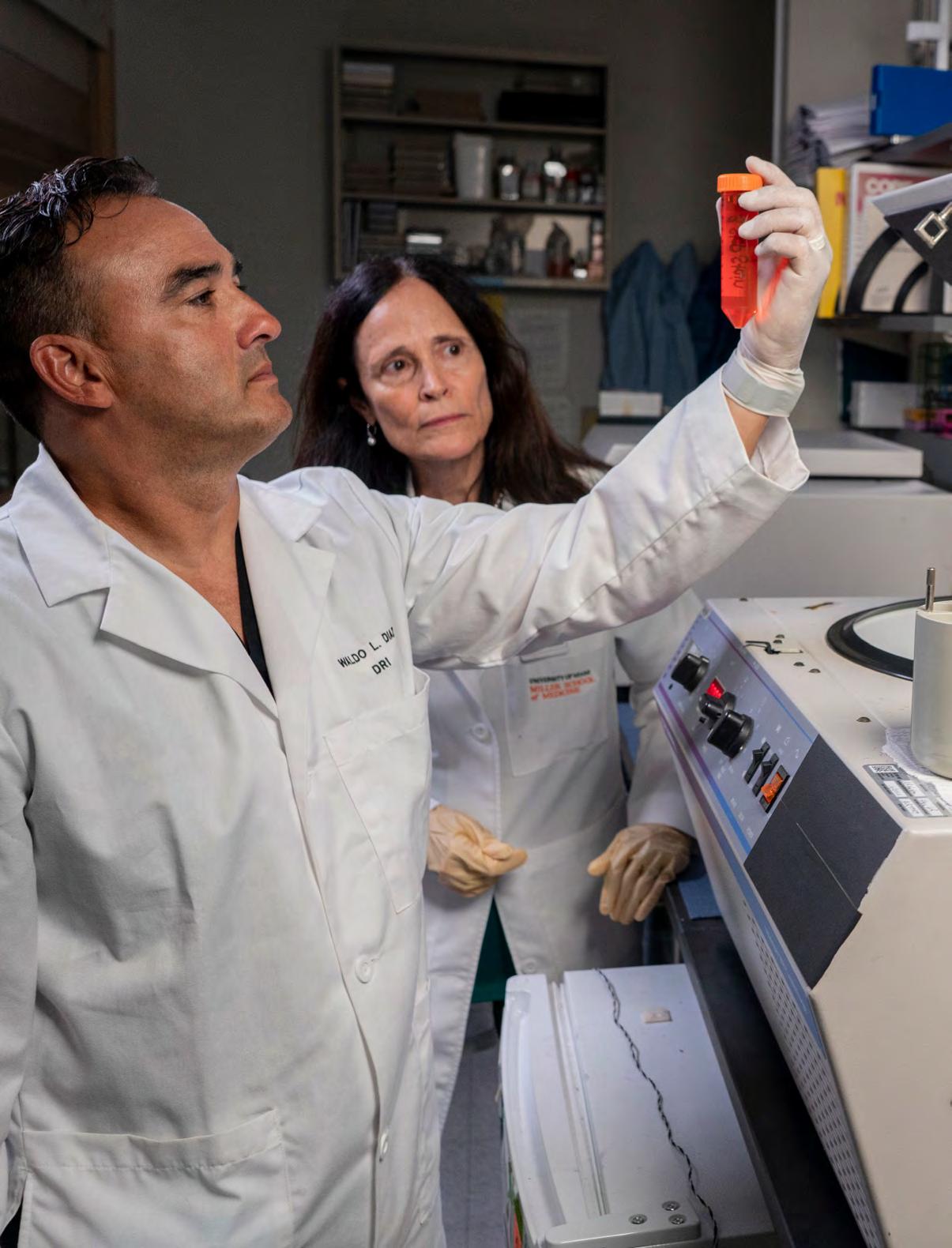
Dear Friends:
FY 24 (July 1, 2023 – June 30, 2024) was a year of tremendous progress at the Diabetes Research Institute Foundation (DRIF), including important operational restructuring, leadership change, and exciting promise on the scientific front at the Diabetes Research Institute (DRI). Our thanks to the unwavering dedication of donors, staff and strategic partners, as well as the incredible DRI scientists and researchers under the leadership of Scientific Director Dr. Matthias von Herrath. We are particularly grateful for the continued support of the University of Miami, led by UM President Julio Frenk and Dean Henri Ford, MD. (Joe Echevarria was named UM president in October 2024.) While philanthropic headwinds due in part to geopolitical conflicts and economic uncertainties impacted fundraising efforts across most if not all sectors, donor commitment to the cure-focused mission of the DRIF proved that selfless collaboration can overcome even the greatest of obstacles.
This FY24 Annual Report provides an in-depth look at the transformational advancements which took place within our walls at the Diabetes Research Institute and Foundation, supported in part by a generous $1M gift from the Sundheim Family Foundation, which helped us increase revenue by 25% over FY23 ($11M vs $8.3M).
Strategically, the DRI embarked on a more refined discovery pathway focusing on the following:
• A new scientific strategy guided by key scientific developments in the field. “As part of our mission to conquer diabetes,” said Dr. von Herrath, “the DRI must identify and prioritize specific challenges: our ‘must-win battles.’ Addressing these is essential, much like a well-planned war strategy.” The DRI is now positioned as a leading accelerator in the field, bridging disciplines to ensure transformative discoveries are successfully realized.
• The creation of Affinity Groups – Immunology, Devices/Transplantation, and Beta Cell Robustness and Augmentation. Working as partners toward a common goal, these groups are incubators of ideas and solutions that are already accelerating the DRI’s journey toward cure and prevention.
• A deeper understanding of the relationship between type 1 diabetes (T1D) and type 2 diabetes (T2D). What were once thought to be two disparate diagnoses we now recognize as closely connected and interrelated conditions. Advances in T2D research are highly likely to accelerate progress toward treatment for T1D and vice versa.
We also proudly unveiled the NABTU Regenerative Medicine and CGMP Center at the DRI headquarters in the spring of 2024. NABTU (North America’s Building Trades Unions), a long-time philanthropic partner to the DRIF, has raised more than $75 million since 1984 to help find a cure for T1D and contributed its time, talent and resources to build the DRI headquarters in Miami.
As you read through the following pages and gain greater appreciation for how our scientists at the DRI are collaborating internally and partnering globally to advance diabetes knowledge and clarity, know that none of this would be possible without the generosity and commitment of our passionate donors. It is through their belief in our mission – Advancing science to cure and prevent diabetes and change the lives of people with diabetes – that we continue moving closer to a world without diabetes.
For many of our Foundation staff, DRI faculty and researchers, donors and advocates, our mission could not be more personal. In other words, we share a heartfelt obligation to continue the fight until our objective has been met. And you have our promise that we will not rest until that day is reached.
• To our donors and volunteers: we are grateful for your vision, compassion and generosity in support of our critical work.
• To our clinicians and researchers at the Diabetes Research Institute: your tireless dedication inspires all of us to do our very best.
• To our outstanding team of professionals at the Diabetes Research Institute Foundation: your hard work, talent and perseverance in a year of great change and challenge is a perfect example of what we can accomplish when we work together and stay focused on our mission.
We look forward to continued progress in the year ahead, and from the bottom of our hearts…we thank you!
Sincerely,
William Fishlinger Chairman of the National Board of Directors Diabetes Research Institute Foundation
Michael Burton Chief Executive Officer Diabetes Research Institute Foundation
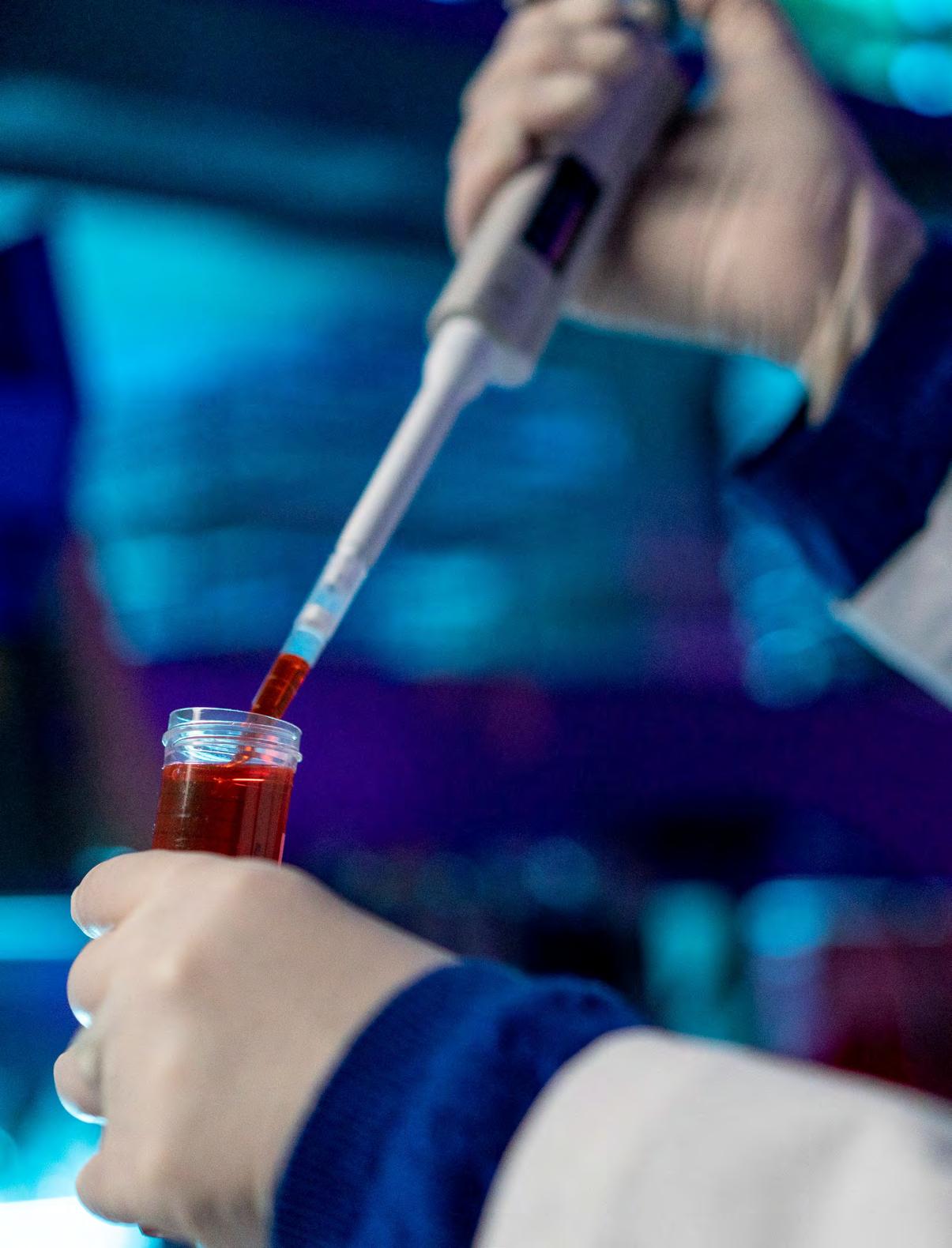
The DRI is now positioned as a leading accelerator in the field. “
Simply put, scientific research at the DRI aims to uncover the roles that cells, molecules and genes play in the development of diabetes. This enhanced knowledge is vital to the development of drugs, cell therapies, devices and other technologies and has begun to open the door to prevention, modification, and even reversal of disease. But how do our scientists take laboratory findings and translate them into therapeutic strategies that can help people?
Scientists across the globe, in both academic and commercial organizations, are hunting for new treatments for diabetes. The pathway of a potential therapy from laboratory science to clinical use in humans is often bumpy. It is an uncomfortable truth that many ideas for treatment will fail at some point in the journey, for reasons such as lack of efficacy, intolerable side effects, or unacceptable production costs. Often research carried out in academic organizations will stall during the transition to clinical trials, which are expensive and complicated to set up. Most academic organizations will have to go through a long and difficult process to find a company to partner with to keep the process moving forward. On the other hand, commercial organizations may have different stumbling blocks to contend with - the commercial drug discovery process is notoriously secretive, and discoveries are usually kept confidential until a treatment is in clinical trial. This confidentiality means that scientists are often unable to collaborate and share ideas freely with other scientists. The lack of intellectual freedom reduces the number of ideas that are plugged into the pipeline, slows the transition through the development process and reduces the number of positive outcomes.
The good news is that despite the high failure rate for the drug discovery process, there are countless success stories and exciting new treatments for many diseases that are licensed daily. At the DRI we have the infrastructure, scientists, and intellectual freedom to be able to take ideas directly from initial laboratory research to preclinical models and, ultimately, to clinical studies in humans all under one roof. Scientists from the DRI are leading several clinical trials and have active collaborations with dozens of academic and industry partners worldwide.
Our relationships with companies that support large-scale production of cells and immune intervention agents that can lead to a safe and effective biological cure are critically important. Whether we engage with startups pursuing novel agents for immune intervention or companies focused on devices that can deliver local immune intervention, our collaborative engagement with companies is essential for taking ground-breaking research from the laboratory to patients.
We are at a transformational crossroads in this regard, with many companies engaging in the development of stem cellderived insulin-producing cells and novel immune intervention agents that have shown significant promise. It will still take time, but our dreams of a mere decade ago are turning into reality. We are confident that discoveries made at the DRI will continue advancing science to ultimately cure and prevent diabetes and change the lives of people living with diabetes.
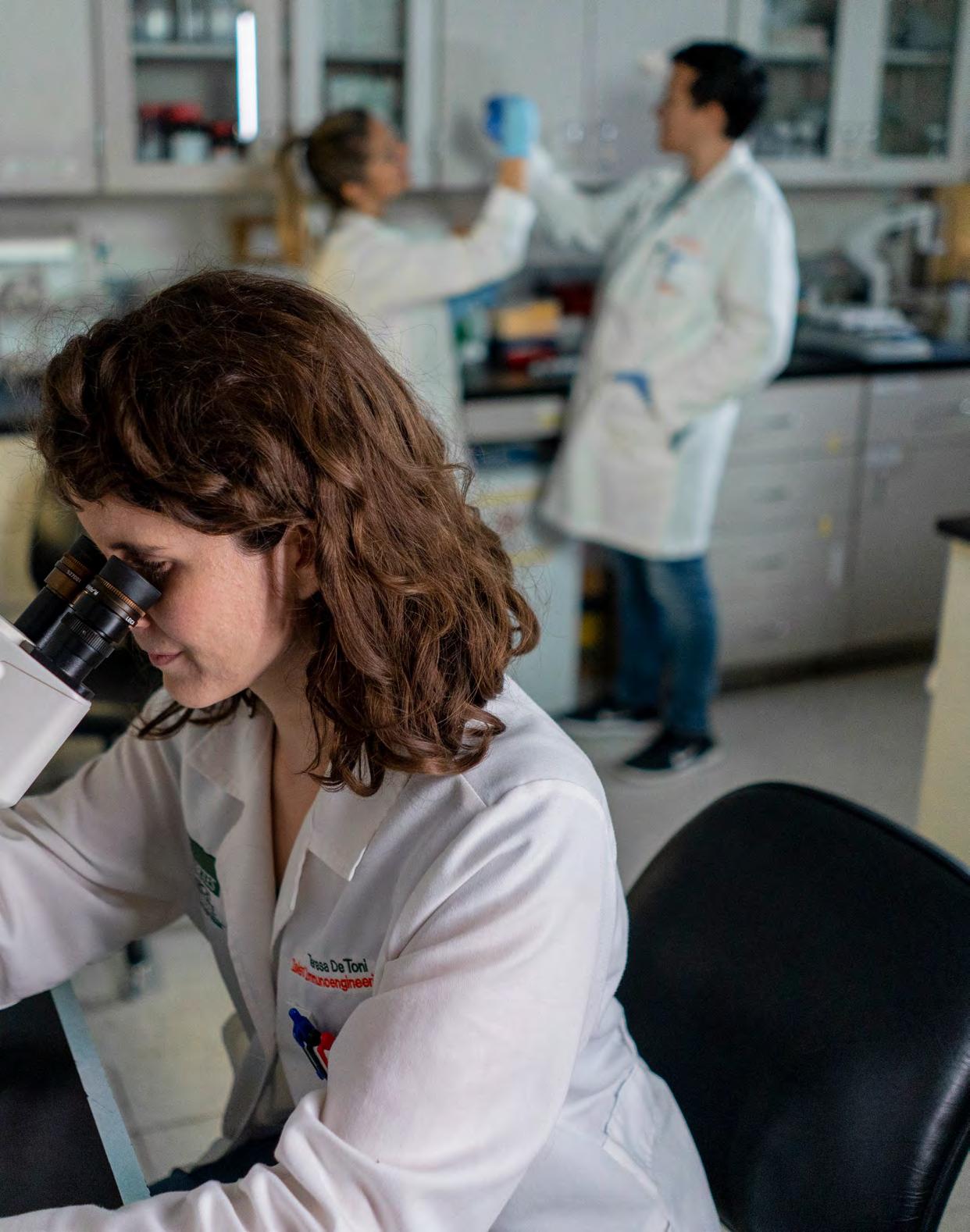
Maximize the potential to cure and prevent diabetes
Maximize the numbers of ideas/proposals
Make smart decisions on which projects progress
Collaborate with other experts and academia
Ensure seamless transitions at each stage
Communicate results effectively
from the DRI are leading several clinical
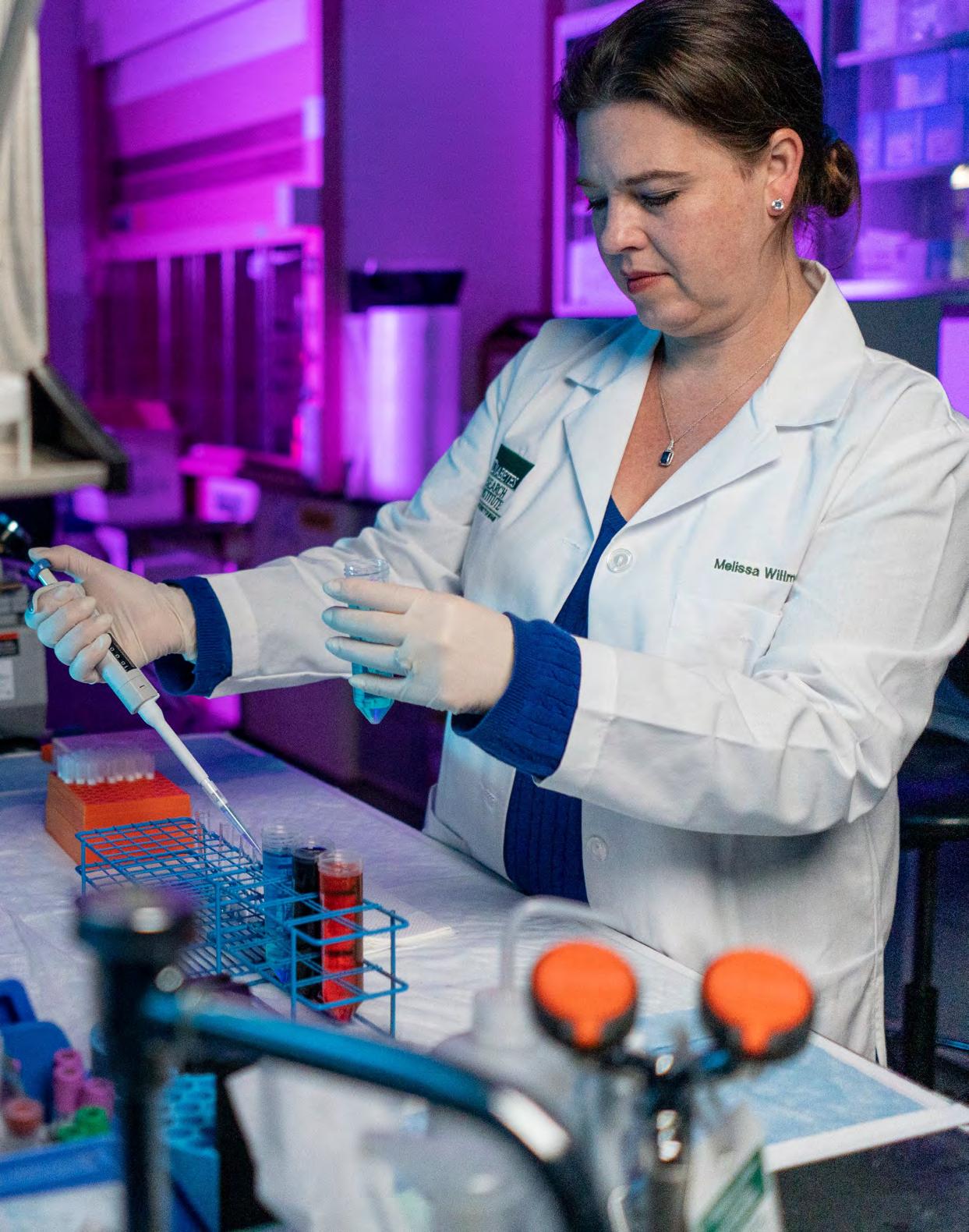
The Diabetes Research Institute is actively involved in a broad spectrum of research efforts aimed at curing T1D, including both preclinical studies in the laboratory and clinical trials involving patients. These clinical trials focus on prevention, disease-modifying therapies, immune modulation, and innovative cell-based treatments. Each trial is a crucial step toward improving the lives of people with diabetes and ultimately finding a cure. The DRI’s clinical team plays a central role in these studies, with dedicated physicians, coordinators, nurses, regulatory experts, data analysts, and research specialists working together to ensure rigorous study conduct and compassionate patient care. This multidisciplinary team is led by experienced investigators, including Drs. Jay Skyler and Camillo Ricordi, and supported by experts in immunology, endocrinology, and transplant medicine, making the DRI a key partner in advancing cutting-edge diabetes therapies. Here is a summary of the trials in which the DRI was involved during the period of July 1, 2023 - June 30, 2024:
Every
trial brings us one step closer to a cure. The DRI is leading clinical efforts across prevention, treatment, and long-term care for people with T1D.
Vertex Pharmaceuticals Trials
VX20-880-101 I A Phase 1/2 Study of VX-880 for T1D
This trial is evaluating the safety and efficacy of a new cell therapy called VX-880 for people with T1D who are unable to sense low blood sugar (hypoglycemic unawareness) and who experience severe hypoglycemic episodes. VX-880 is made of insulin-producing islet-like cells derived from stem cells. These cells are infused into the liver and require immunesuppressing medication to prevent rejection.
DRI’s Role: As a leading center for islet transplantation and diabetes innovation, the DRI is one of the participating sites helping to enroll and monitor patients. The trial includes a 5-year long-term follow-up phase to understand the durability and long-term effects of this treatment.
VX22-264-101 I A Phase 1/2 Study of VX-264 for T1D
This study uses stem cell derived islet cells, like VX-880, but delivers them inside a special device that protects the cells from immune attack, possibly eliminating the need for anti-rejection drugs.
DRI’s Role: The DRI is contributing its clinical and immunological expertise by following patients closely to evaluate both safety and whether this “encapsulated” version of the therapy can help patients produce insulin on their own. (This study was discontinued in FY25 due to lack of clinical efficacy.)
CELZ-201 is a novel, cell-based therapy derived from a patient’s own cells. The treatment aims to help preserve or restore insulin production when given soon after diagnosis, when some insulin-producing beta cells may still be active.
DRI’s Role: As one of the study sites, the DRI is enrolling individuals recently diagnosed with T1D and collecting important biological samples to track immune responses and beta cell function over time.
Our researchers bring a wealth of experience and expertise to every aspect of our mission. “
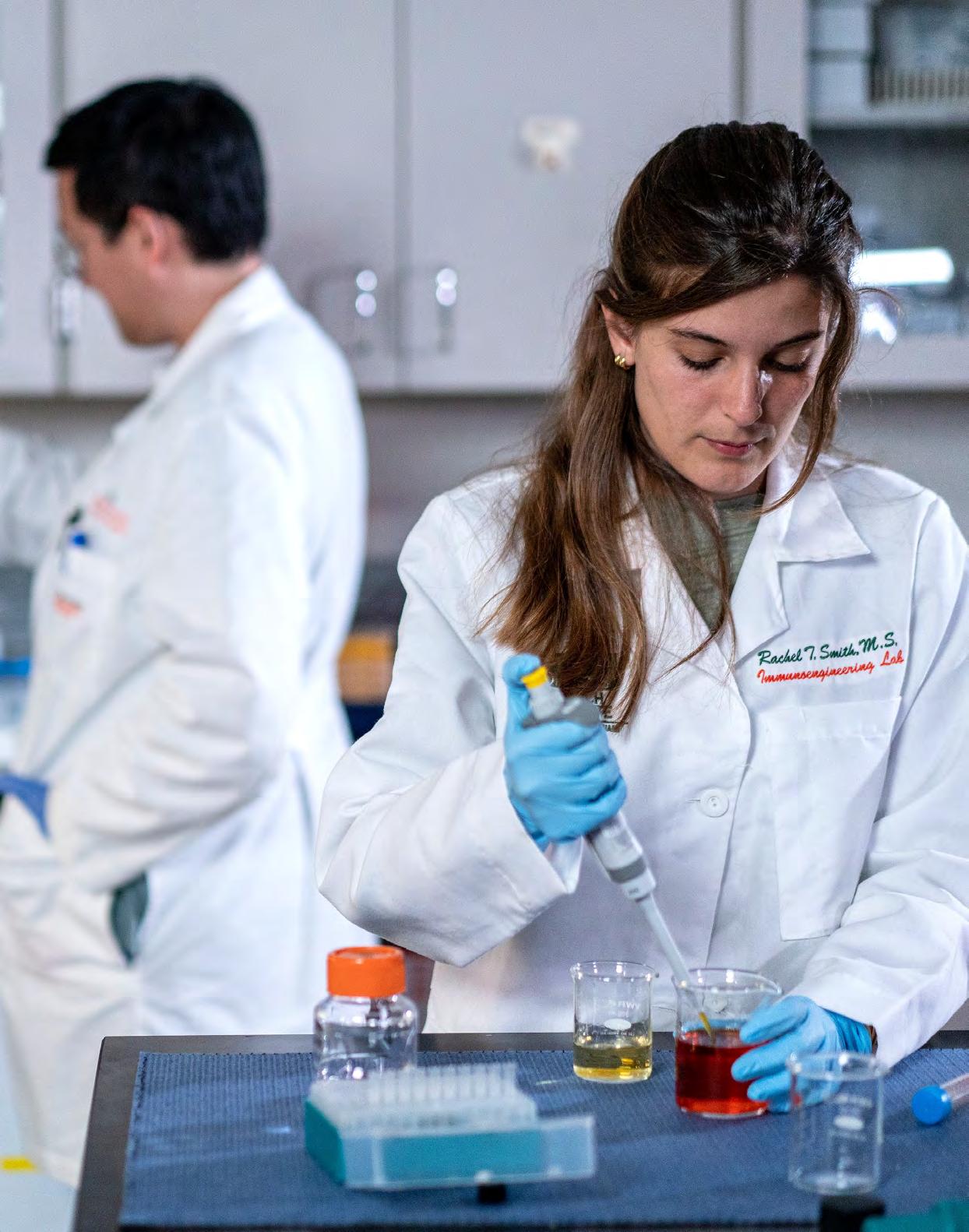
This exploratory study investigates a new site for islet transplantation: the eye. By placing islets in the anterior chamber of the eye, researchers can directly observe their function and survival over time—something not possible in traditional transplant sites.
DRI’s Role: This pioneering study was designed and is led by DRI scientists. It represents a bold step in testing how immune responses and beta cell health can be monitored and potentially improved in a non-traditional transplant site.
This long-running study screens relatives of people with T1D to determine whether they have autoantibodies that indicate early risk for the disease. Participants are then monitored over time.
DRI’s Role: The DRI is a TrialNet hub, recruiting families, conducting lab testing, and guiding participants through the screening and monitoring process. The goal is to identify individuals before they develop symptoms and offer prevention trials.
This protocol tracks participants who have taken part in prior prevention or intervention studies, gathering long-term data on disease progression, health outcomes, and treatment durability.
DRI’s Role: The DRI continues to follow these participants over time, maintaining valuable long-term data that contributes to future study design and clinical care insights.
This prevention trial tests whether a low dose of immune therapy called ATG, already used in transplant medicine, can delay or prevent the development of T1D in at-risk individuals.
DRI’s Role: The DRI is recruiting and treating participants, closely monitoring for changes in immune markers and blood sugar control.
This observational study explores how the pancreas changes before the onset of T1D - not only in the insulin-producing part (endocrine) but also in the part that helps with digestion (exocrine).
DRI’s Role: This study is led by DRI researchers seeking to uncover early signs of pancreatic dysfunction, which may lead to better prediction tools and early interventions.
This extension study follows individuals who participated in the PROTECT trial, which evaluated teplizumab (a recently approved therapy to delay T1D). The extension gathers more data on long-term effects.
DRI’s Role: The DRI continues to follow these individuals, contributing essential data on how the treatment performs beyond the initial trial period.
This study uses a novel precision medicine approach to test a drug called Siplizumab, which targets a specific type of immune cell (T cell). The goal is to match the dose of the drug to a patient’s unique immune profile.
DRI’s Role: The DRI is leading this trial, leveraging its clinical team to develop and apply personalized dosing strategies. This study could open the door to more individualized immune therapies in T1D.
Prevention & Screening TrialNet TN-01, TN-28 – identifying and treating at-risk individuals early
Immune Therapy DESIGNATE, ATG studies – stopping the immune attack that causes T1D
Beta Cell Regeneration CELZ-201 – preserving and potentially restoring insulin-producing cells
Cell Replacement VX-880, VX-264 – stem cell-derived islets to restore insulin production
Novel Monitoring Intraocular Islet Transplant – allowing direct observation of islet survival and function
Long-Term Outcomes TN16, PROTECT – understanding how therapies work over the long term
From lab bench to life-changing results, the DRI pipeline is built on innovation, compassion, and your support.
DiscoveryEarly Detection & Prevention
Pre-clinical innovations in labs and models
Treatment & Intervention Long-term follow-up
Identifying risk before symptoms appear Preventing or restoring beta-cells and insulin production
Understanding how therapies perform over time
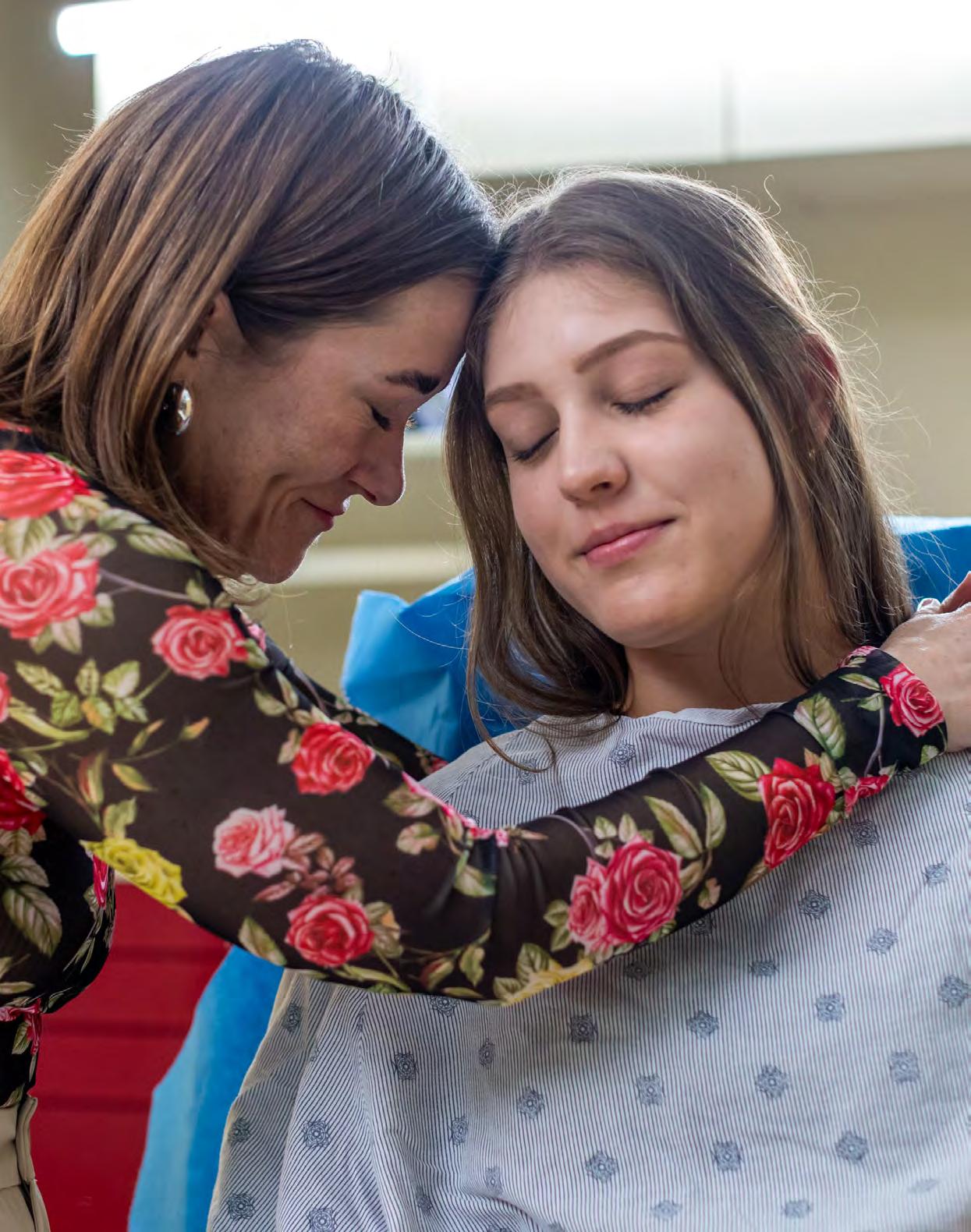
“
From
lab bench to life-changing results...
AUGUST 2023 I Patricia and Roger Silverstein Host Third Annual Hamptons Garden Gala
The Hamptons Garden Gala hosted by National Board Director Roger Silverstein and his wife, Patricia, was an unforgettable night of fun and inspiration in the Hamptons, where over 150 guests helped raise $270,000.
Photo 1: Patricia and Roger Silverstein
SEPTEMBER 2023
The annual Walk, Run, or Ride event brought together Long Island families for a morning of fun and empowerment at Cedar Creek Park, on Long Island, New York. Participants were able to walk, run or ride their bikes on the closed to traffic path that runs along the picturesque Ocean Parkway and the event raised over $97,000.
Photo 2: Event Participants
The Donaldson Organization Golf Outing at New York’s renowned Winged Foot Golf Club in Westchester County was nothing short of remarkable! Thanks to the Donaldson Family and honorees (need to look up honoree names), 216 dedicated golfers hit the course and raised over $630,000 Pictured: Bob, Matt, Ty, and Doug Donaldson.
Photo 3: Bob, Matt, Ty, and Doug Donaldson
NOVEMBER 2023 I Decades of Discoveries
The University of Miami Miller School of Medicine hosted an exclusive cocktail reception entitled “Decades of Discoveries,” celebrating the Diabetes Research Institute’s 50+ years of contributions in advancing cure-focused diabetes research. Held at Penthouse at Riverside Wharf, notable guests included University of Miami President, Dr. Julio Frenk; Dean of the Leonard M. Miller School of Medicine, Dr. Henri Ford; DRI Scientific Director, Dr. Matthias von Herrath; Chairman of the National Board of Directors for the Diabetes Research Institute Foundation, William Fishlinger; and DRIF Chief Executive Officer, Michael J. Burton. A special announcement was made regarding a new $50M pledge from the Diabetes Research Institute Foundation, making the Foundation one of the largest donors to the University of Miami with over $270M in support.
Photo 4: Dean Henri Ford, Marc Goodman, Dr. Matthias von Herrath, Bill Fishlinger, UM President Julio Frenk, Michael Burton
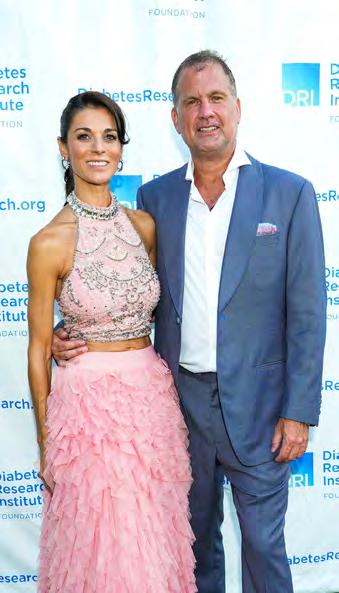
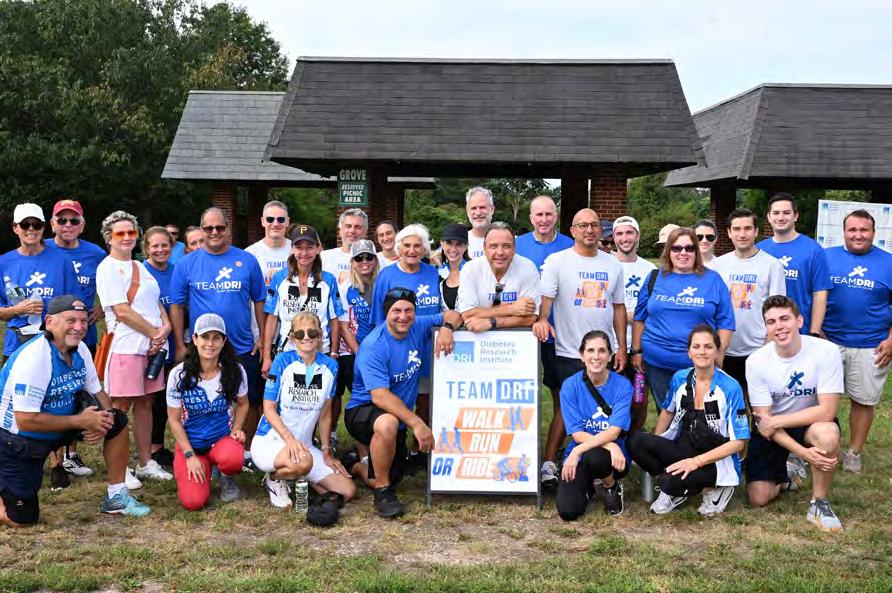


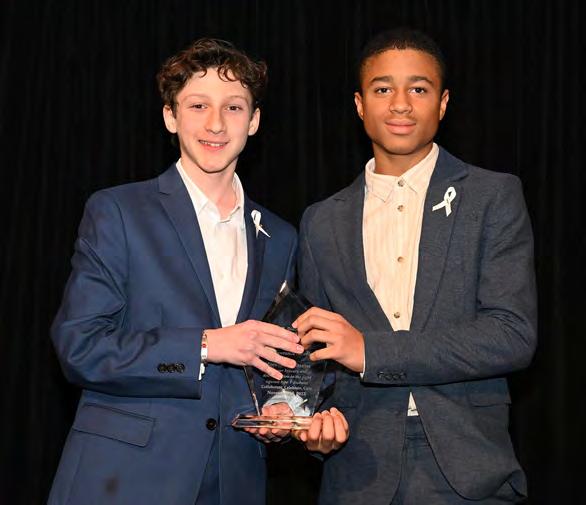
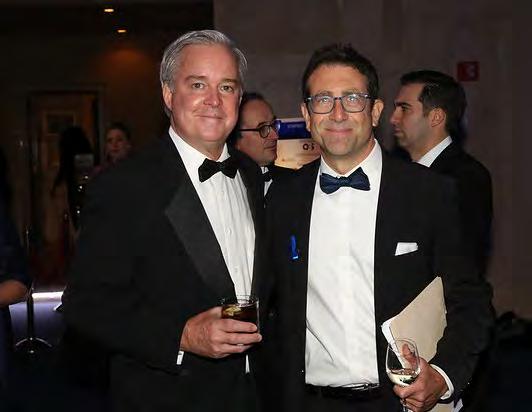
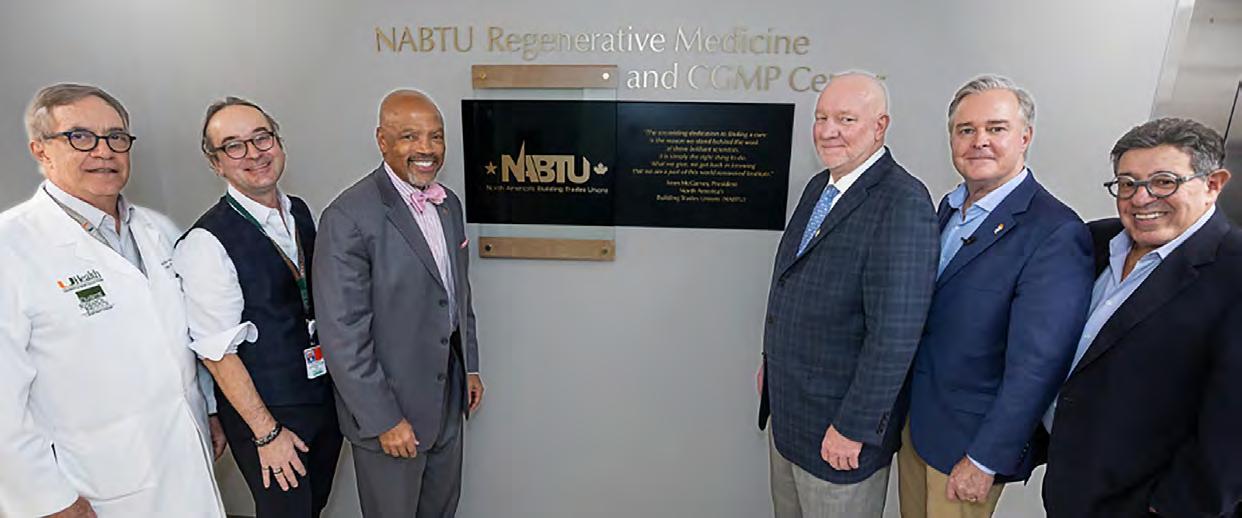
2023 I Collaborate, Celebrate, Cure Gala
The 5th Annual NYC C3 – Collaborate, Celebrate, Cure - gala was held at Capitale and honored Joe Scheerer, Miles NúñezErasme, and Francesca DeCurtis, with past award recipients Evan Morris and Kylie McDonald serving as guest presenters and raised over $280,000.
Photo 5: Evan Morris and Miles Núñez-Erasme
The 39th Annual Empire Ball was held at Cipriani Wall Street and drew over 500 leaders from New York’s real estate and construction industries for a night of celebration and purpose. Honoring Bruce Mosler of Cushman & Wakefield and Mike Anello of Turner & Townsend, the event raised over $800,000 and pushed the event’s total contribution to over $43 million.
Photo 6: Michael Burton and Stephen Rizzo
FEBRUARY 2024 I DRI Honors North America’s Building Trades Unions with the NABTU Regenerative Medicine and CGMP Center
The DRI unveiled the NABTU Regenerative Medicine and CGMP Center, a hallmark of the cutting-edge research at the DRI…the house that NABTU built!
Photo 7: (left to right): Dr. Camillo Ricordi, Chief of the Division of Cellular Transplantation, Department of Surgery and Director Emeritus of the DRI at the University of Miami Miller School of Medicine, Dr. Matthias von Herrath, Scientific Director of the DRI and Stacy Joy Goodman Chair at the University of Miami Miller School of Medicine, Dean Henri Ford, Dean and Chief Academic Officer, University of Miami Miller School of Medicine, Sean McGarvey, President of North America’s Building Trades Unions, Michael Burton, Chief Executive Officer of the Diabetes Research Institute Foundation, and Marc Goodman, Former Chairman of the Board, Present member - DRIF National Board.
APRIL 2024 I Out of the Kitchen – South Florida
Twenty of South Florida’s finest culinary chefs treated a sold-out audience to an epicurean extravaganza at The Diplomat Beach Resort Hollywood. The event, presented by the Nathan J. Esformes Foundation, raised over $435,000.
8: Carlos Toro, Liliana Toro, Julia Simons, Raul Argote Muñoz, and Annie Esformes
APRIL 2024 I Out of the Kitchen - New York
The Second Annual Out of the Kitchen - New York, presented by the Nathan J. Esformes Foundation, transformed the Altman Building into a culinary haven and raised over $305K.
Photo 10: Participating Chefs 2023
MAY 2024 I Don Strock Diabetes Golf Classic, Raising Over $130K
Former Miami Dolphins quarterback Don Strock led golfers onto the course at Miccosukee Golf and Country Club in West Kendall for the 39th Annual Don Strock Diabetes Golf Classic and raised over $130,000.
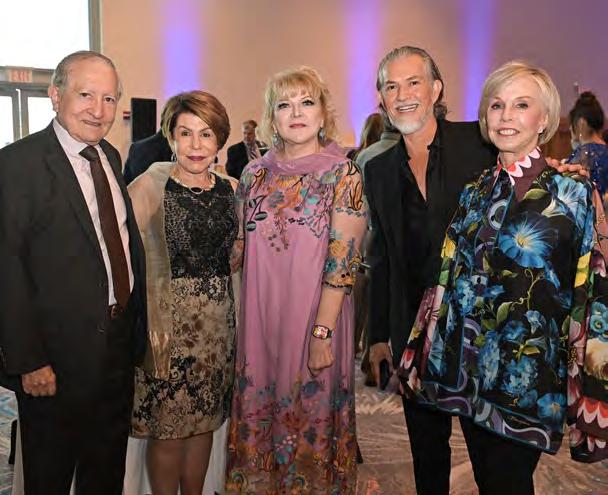
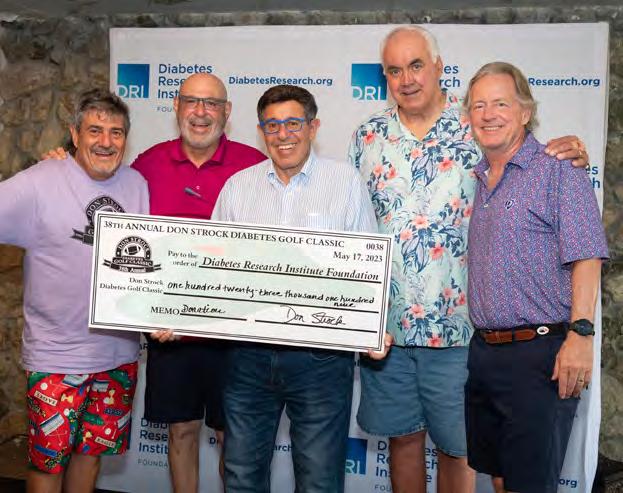
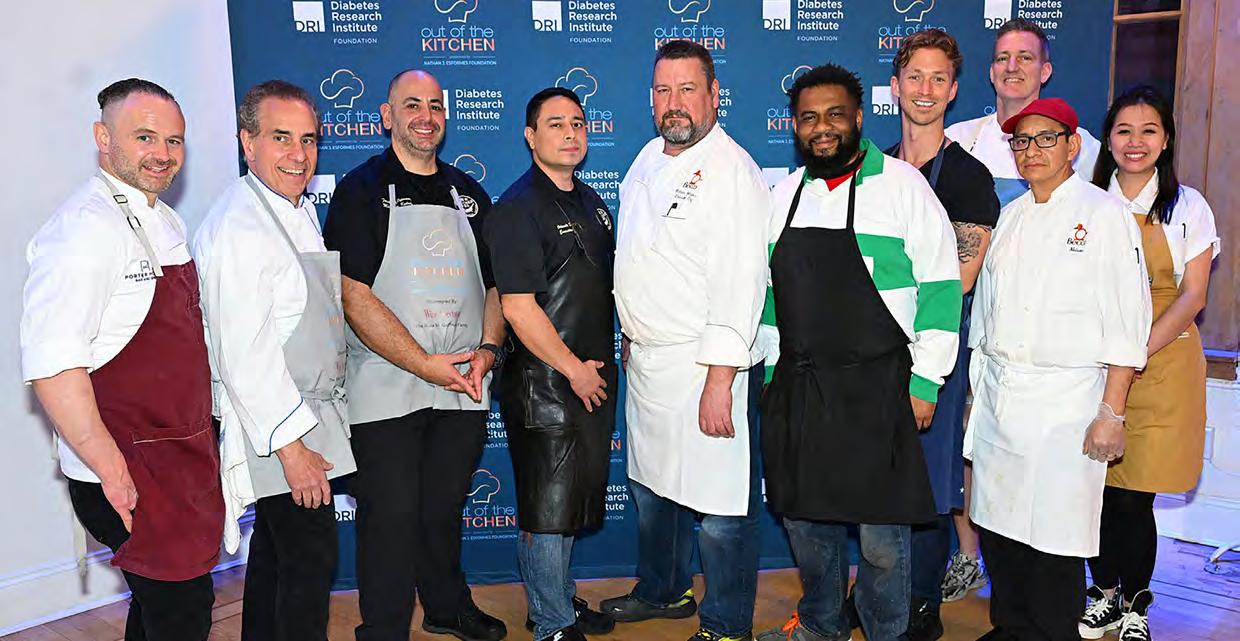
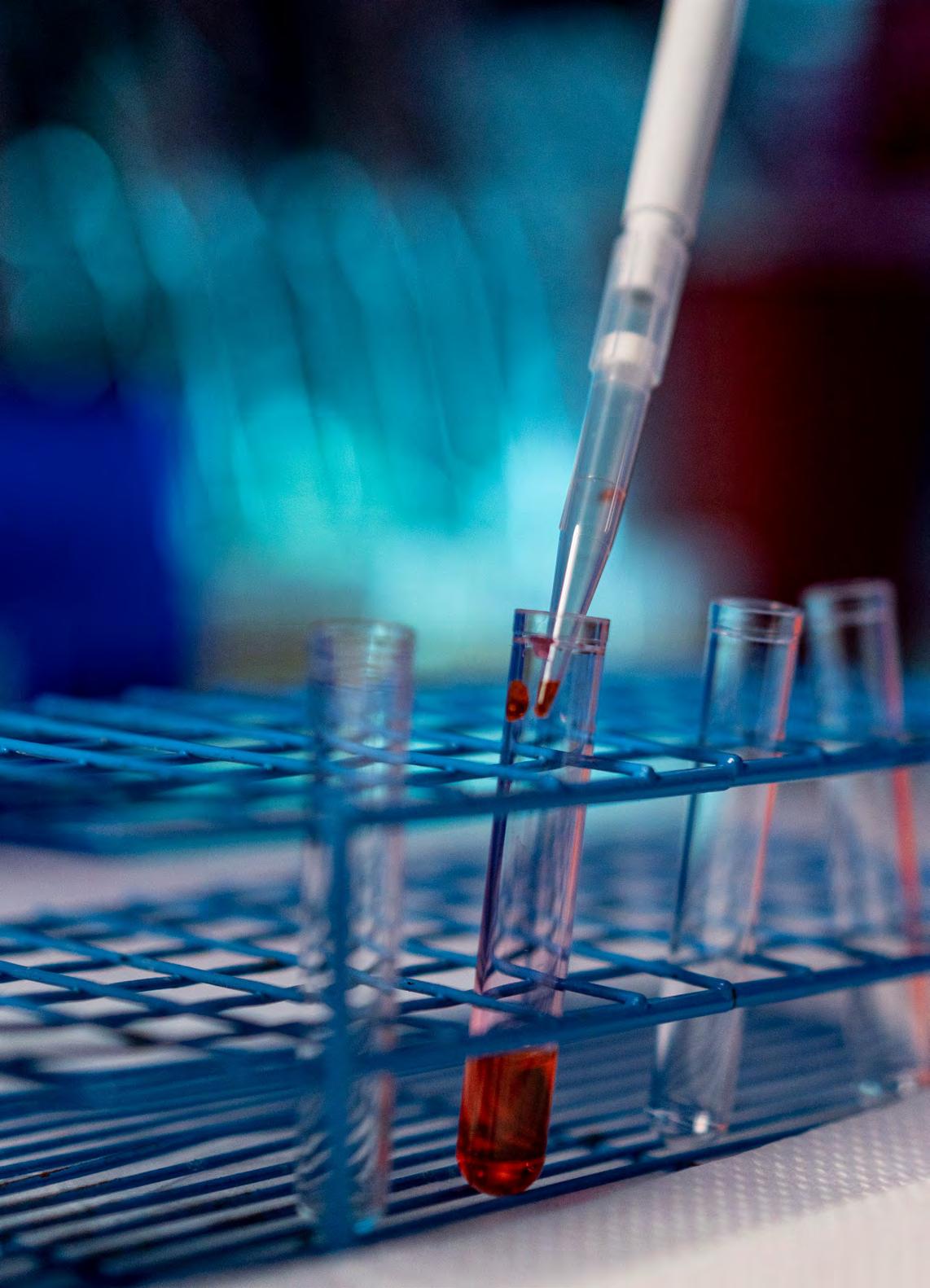
(as of July 1, 2023)
Executive Committee
William J. Fishlinger - Chairman
Harold Doran
John Doscas
Marc Goodman
Bonnie Inserra
Charlie Rizzo
Bruce Siegel Matthew Stubbs
Directors
Marlene Berg
Ron Maurice Darling, Jr.
Marc S. Goldfarb
Esther Goodman
Lindsey Inserra
Eleanor Kosow
Scarlett Leung
Sean McGarvey
Ramon Poo
Stephen Rizzo
Ricardo Salmon
Roger Silverstein
Rick Tonkinson
Jill Viner
Bruce Waller